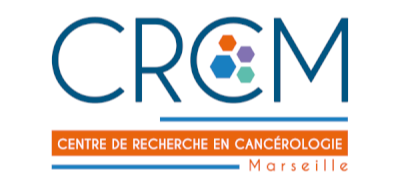
The team
The team "Membrane Proteomics and Cancer (MEMPROT)" created in May 2025 at the Cancer Research Centre of Marseille uses last advances in high resolution mass spectrometry to characterize proteins at the surface of cancer cells to find proteins isoforms and post-translational modifications of value during cancer progression, resistance and relapse and discover new potential therapeutic targets and biomarkers. We have a long expertise in the study of G protein-coupled receptors (GPCRs), highly druggable proteins that represent the targets of more than 35% of actual drugs used in clinics but are still underexploited in the field of cancer. Generation of in-house nanobodies/antibodies against the dysregulated GPCRs will push further the characterization in larger cohorts of samples and hopefully will produce immunopharmacological tools to correct
GPCRs activity in cancer cells or drive targeted therapeutics.
The PhD Project
In the frame of this team and a project recently funded by the French government under the France 2030 investment plan, as part of the Initiative of Excellence of Aix-Marseille University – AMIDEX, we propose a 3 years PhD project which will focus on a selection of candidate GPCRs potentially important in breast cancer. PhD student will clone and express the different isoforms described for these receptors in breast cancer cell lines to estimate oncogenic properties in terms of proliferation, migration, invasion and tumorigenicity. The same cell line will allow the development of methods to specifically detect and quantify by mass spectrometry the proteoforms of the receptors. Then, expression of the different proteoforms will be measured in a variety of cells lines, in xenografts, in organoids derived from patients and in human biopsies, ultimately using single cell proteomics methods we are currently developing. In-house nanobodies against the extracellular part of the GPCR will be developed to push further the characterization in larger cohorts of samples and hopefully produce immunopharmacological tools to correct GPCRs activity in breast cancer cells or drive targeted therapeutics.
The PhD candidate will work in close collaboration with several other research groups at CRCM and with the Marseille Proteomics platform (MAP) located in the same building.
Key words: breast cancer, GPCR, targeted mass spectrometry, single cell proteomics, nanobody
Application deadline: July 27th, 2025
Contact: franck.vandermoere@cnrs.fr
Candidate profile
Master degree or equivalent preferentially in cancer biology, in cellular biology or in biochemistry.
Previous experience in peptide biochemistry, in protein biochemistry or in mass spectrometry is a plus but not mandatory.
Project environment
The Marseille Cancer Research Centre (CRCM) comprises nearly 450 people in 21 teams and 18 technological platforms coordinated in the form of a Core Tech. More than 25 nationalities are represented at CRCM, collaborating with the largest national and international institutes and partnering with multiple networks of excellence. CRCM works in close interaction with its neighbour, the Institut Paoli Calmettes (IPC), one of the best medical centres in France for the fight against cancer.
Research at the CRCM addresses fundamental aspects, ranging from initiation to development of cancer to its dissemination in more aggressive (metastatic) form with the objective of identifying molecular alterations, mechanisms of genome instability and repair and studying their functional consequences in in vitro and in vivo settings. The contribution of the tumour microenvironment and the immune system are other important and contributing area of research at the CRCM. This interdisciplinary research is carried out at the molecular, cellular and pathophysiological levels, using simple and more complex cellular models (organoids) or recapitulating the stages of the tumour process in animals. These multi-scale approaches allow the identification of new therapeutic targets and aim to develop innovative approaches targeting alterations in the cancer cell or its environment with the aim of progressing towards new treatments.
Translational and clinical research allows the identification of new prognostic and diagnostic biomarkers and the launch of innovative clinical trials closely linked to laboratory activities, a strategy that is another major strength of the CRCM and IPC. This continuum of basic-translational-clinical science is the hallmark of the CRCM, consistent with the founding missions of the IPC – patient care, education, research and innovation – and is reflected in numerous joint publications between researchers and clinicians.
The CRCM is also strongly involved in training through its involvement in the Masters and Doctorate courses of the Aix-Marseille University and the University Institutes in Cancer and Immunology, Imaging and Artificial Intelligence.

